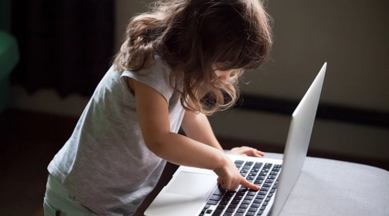How parents can help their kids stay safe online
The truth is that wherever children are there is a danger of them being hurt, the only true way to protect our children is creating a safe space for them to come and voice their feelings.

By Tanya Percy Vasunia
In today’s world, social media is the way we connect, share information and learn about the world and lives of people around us. While social media has many positive points there are many negatives as well. Cyberbullying and toxic content like pro-anorexia websites, self-harm websites and child pornography are becoming increasingly prevalent and are having a terribly negative impact on the youth.
monthly limit of free stories.
with an Express account.
“I saw Rahul change overnight. He stopped smiling, he constantly checked his phone. He looked so uncomfortable, I wasn’t sure… my husband said it was teenage hormones…I wasn’t sure. It was only when the school called saying Rahul had cut himself with a protractor that I knew, I was right; something had happened. I checked his web-history and there it was, all these websites about cutting.” – A 38-year-old mother of two.
She is one of many parents who are concerned and unsure of how to approach or assist their child when it comes to tackling and navigating the internet, and all its content. Parents worry that restricting access to the internet will isolate their children socially or may result in them hiding and using their devices. Many parents are left feeling confused and scared about social media and the internet, and this confusion inevitably causes conflict in parent-child relationships. While the concerns are valid abstinence is not the answer it is important that parents work on looking at practical long term solutions to this safety concern.
A few strategies that parents can start implementing immediately:
Start early and remain consistent
For all parents who have children below the age of 10, it is imperative that you identify and communicate certain ground rules about using the internet. If you start early these guidelines become normalised for children and pave the way for parents to continue to be involved and monitor internet use and content.
Communicate your concerns
Many parents are terrified that if they discuss their concerns about the Blue Whale Challenge, porn, anonymous chat rooms, etc, their children will get curious and this will lead them to exploring online. This is untrue and it is very important to have open and honest conversations with your child about the negative content on the internet and consequences of engaging with them.
Educate yourself
For many parents particularly those who did not grow up in the age of smart phones, the internet is a bit of a mystery and fully understanding it is challenging. This often results in parents being unable to understand if their concerns about certain internet related things are valid or appropriate. It is imperative for parents to get on the internet themselves to explore, learn and understand. If your child feels you are in the loop and understand what is out there not only are they more likely to come to you with questions but will be more willing to take your guidance.
Do not be afraid to use the internet, to control the internet
As previously mentioned not everything about the internet is negative. There is a large section of technology development is aimed at keeping individuals safe and ensuring that the internet is a positive environment. If you feel your child is too young to understand the dangers of the internet or will not be willing to communicate if there is a concern, using website blockers and apps that allow you to monitor internet activity are small but effective ways for parents to manage internet safety.
Recently, there have been a number of “online challenges” which have resulted in children unintentionally hurting themselves or others. There is a growing concern that there are many online who manipulate and bully vulnerable youth. The truth is that wherever children are there is a danger of them being hurt, the only true way to protect our children is creating a safe space for them to come and voice their feelings. Social media may connect us but in person face to face communication is extremely powerful and the strongest tool parents have to keep their children safe.
Also Read| A parent’s guide to Instagram: How to keep your teen safe online
(The writer is Psychologist & Lead Clinical Collaborations: Mpower – The Centre, Mumbai.)